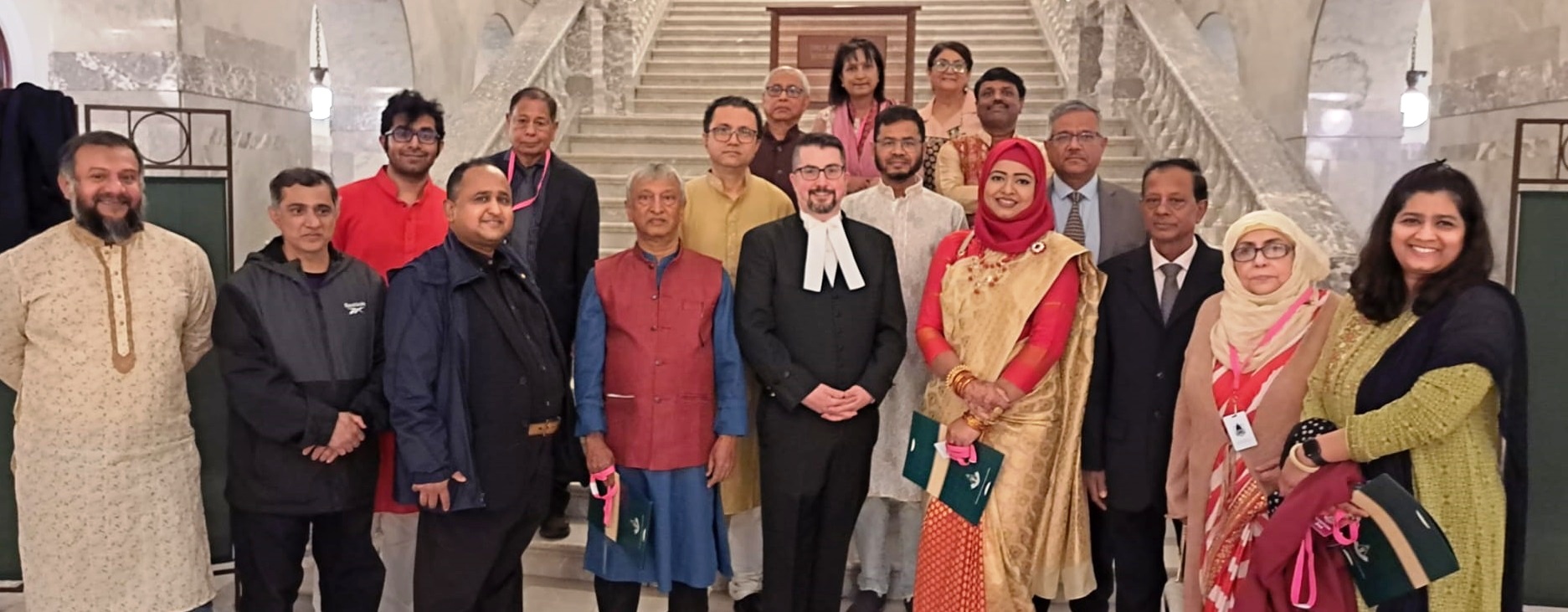Requirements not met
Your browser does not meet the minimum requirements of this website. Though you can continue browsing, some features may not be available to you.
Browser unsupported
Please note that our site has been optimized for a modern browser environment. You are using »an unsupported or outdated software«. We recommend that you perform a free upgrade to any of the following alternatives:
Using a browser that does not meet the minimum requirements for this site will likely cause portions of the site not to function properly.
Your browser either has JavaScript turned off or does not support JavaScript.
If you are unsure how to enable JavaScript in your browser, please visit wikiHow's »How to Turn on Javascript in Internet Browsers«.
Country News
Bengali New Year Celebrated with Dignity at Alberta Parliament
- Details

Edmonton, Alberta, April 16, 2024: The Alberta Parliament in Edmonton, the capital of Alberta, was not just a venue but a beacon of cultural exchange this afternoon. It resonated with the solemn celebration of the Bengali New Year, marking a significant moment in the cultural calendar.
MLA Jackie Lovely, in a gesture of inclusivity and warmth, extended a heartfelt welcome to leaders of the Bangladesh community at the Legislative Building, setting the tone for a brief but significant meeting between Bengali-speaking community leaders and the Honorable Speaker of Parliament, Nathan Koper.
In his address to the esteemed guests, Speaker Nathan Koper conveyed heartfelt wishes for a joyous Bengali New Year and expressed his anticipation of visiting Bangladesh soon. He emphasized strengthening the bilateral relationship between the Alberta government and Bangladesh.
The essence of the Bengali New Year, with its vibrant festivities such as village fairs, traders' halkhata, Mangal Shobhayatra, Nagordola, and Ramna Botmule Chayanot Asar, where men and women don colorful attire, encapsulates not only the spirit of celebration and tradition but also aspects of individuality, universality, secularism, and humanity. The recognition of these traditional elements of the Bengali New Year finds resonance even in the distant halls of the Alberta Legislature in Canada.
The session commenced with Speaker Nathan Koper introducing various organizations, including the Bangladesh Heritage and Ethnic Society of Alberta, Bangladesh Canada Association of Edmonton, Edmonton Bengali Association, and Alberta Bengali Society, all of which have been instrumental in preserving and promoting Bengali traditional life, culture, and art. Notable guests included Bir Muktijoddha Delwar Jahid, Chief Advisor of Bangladesh Heritage and Ethnic Society of Alberta, Executive Director of Step to Humanity Association, and President of Bangladesh North American Journalist Network, along with other esteemed leaders such as Din Islam, Janmejoy Das Chowdhury, Bikash Talukder, and Rozina Meena.
During the afternoon session, MLA Jackie Lovely presented a statement on Pahela Boishakh. Additionally, veteran libertarian Delwar Jahid held a separate meeting with government caucus MLA Jason Stephan, further fostering dialogue and understanding. Babu Indra Chowdhury, the United Conservative Caucus Community Outreach Coordinator, infused the event with energy and vibrancy, ensuring a lively atmosphere.
Investing in STEM at the University of Calgary
- Details

Budget 2024 will invest $55 million toward a new Multidisciplinary Science Hub at the University of Calgary.
Mar 08, 2024
Alberta’s post-secondary institutions offer world-class education, and this investment will help more students access the University of Calgary's science, technology, engineering, and math (STEM) facilities and training. As the economy continues growing and diversifying, demand from job creators and Alberta’s labour market for the skills and expertise of STEM graduates is projected to increase.
The new hub will become the primary home for research and collaboration in the faculty of science at the University of Calgary and help address the gap in STEM talent shortages in Alberta. Once built, the hub will add at least 2,000 seats to science-related programs to help deliver essential workplace skills for students.
“This significant investment in the Multidisciplinary Science Hub will bring more students to the University of Calgary to develop skills in science, technology, engineering and math, which are needed in our fast-growing economy. I look forward to seeing how this exciting new facility will bring research, collaboration with industry and innovative ideas together under one roof to build skills for the jobs of tomorrow.”
“Alberta’s workforce requires more graduates from STEM programs to meet the growing demands of job creators. Investing in the University of Calgary’s Multidisciplinary Science Hub will support the long-term needs of our economy while creating opportunities for students.”
The Multidisciplinary Science Hub will support STEM students in vital areas such as agriculture innovation, computer science, energy, quantum, biotechnology and aerospace. It is expected to be complete in 2029. The University of Calgary estimates that the full science district project will create a short-term economic stimulus of approximately $639 million, as well as 1,980 total person years of construction-related employment.
“We’re pleased the government has recognized the importance of this transformative new teaching and research hub. The Multidisciplinary Science Hub will help us meet demand from science students and researchers who will have the space and resources to make the discoveries and innovations that push the envelope of what’s possible.”
“From our powerhouse energy industry to our booming tech sector, science is deeply entwined with Alberta's success – past, present and future. This new facility reflects Alberta's commitment to maintaining our great province’s science advantage for decades to come.”
Alberta generates even more jobs in February: Minister Jones
- Details
Minister of Jobs, Economy and Trade Matt Jones issued the following statement on the February 2024 Labour Force Survey from Statistics Canada:
Mar 08, 2024
“Alberta’s labour market continues to show strength, with more Albertans employed in February than at the same time last year. Employment rose to 2.5 million, up 17,400 month-over-month, which is a 4.1 per cent increase year-over-year. Full-time jobs also jumped to 2,070,699.
“While Alberta only accounts for 11.7 per cent of Canada’s population, our province leads the nation in net employment growth, with 42.8 per cent of the country’s employment gains. With a highly skilled workforce, business-friendly policies, diversified economy and affordable, exceptional lifestyle, Alberta continues to be the economic engine of Canada. Our province leads the nation in net employment growth and last week, the Canadian Survey on Business Confidence showed optimism among Alberta businesses was up considerably over the last 12 months, out-pacing the rest of the country.
“We are keeping this momentum going with Budget 2024, which maintains Alberta’s competitive advantage so businesses and industry can continue to innovate, thrive and create jobs. It also ensures Alberta’s economy can remain vibrant and resilient for years to come.
“Alberta continues to lead by example when it comes to jobs and the economy. Strategic investments, even greater diversification and a responsible budget means our province will remain a leader in Canada for investment and job growth.”
Step to Humanity Association(STHA) Unveils Ambitious Plan: Community Clinics to Revolutionize Healthcare in Gazipur and Bangladesh's Coastal Regions
- Details

To bolster healthcare accessibility and quality in Gazipur and Bangladesh's vulnerable coastal regions, the Step to Humanity Association (STHA) has unveiled an innovative project proposal for establishing community clinics. This initiative, designed for gradual implementation, seeks to comprehensively address the diverse healthcare needs of underserved populations.
Under the leadership of executive director Delwar Jahid, the unveiling event featured insights from Dr. Ekramul Azim, a Canadian expatriate scientist who shed light on Bangladesh's critical healthcare challenges. Notable guests included Moazzem Hossain, the Step to Humanity Association secretary, and Mahfuz Enam, an agriculturist and writer.
Moazzem Hossain elaborated on the project's phased approach, emphasizing community engagement through volunteer immersion in local communities to gain firsthand insights into healthcare challenges.
Dr. Ekram underscored the importance of setting up medical camps in rural areas to deliver essential healthcare services and raise awareness about health issues. Collaboration with local physicians was highlighted as essential for grassroots involvement in addressing community health needs.
The project, outlined by Delwar Jahid, addresses pressing concerns such as climate change and food insecurity in densely populated Bangladesh. It emphasizes the need for global cooperation and concerted action to foster a more sustainable and resilient future. Initiatives include enhancing the health and well-being of underserved communities through innovative and sustainable healthcare programs.
Specifically targeting significant health challenges within communities, the project aims to increase healthcare accessibility, promote preventive care, raise health awareness, and empower individuals to manage their own health effectively. Sustainability beyond the initial stages is ensured through diverse funding sources such as government grants, private donors, and corporate sponsors.
A critical step in the project involves identifying suitable clinic locations and ensuring accessibility and regulatory compliance. Subsequent stages include establishing pharmacies for affordable medication distribution, providing free medical consultations by qualified physicians, and introducing physiotherapy clinics for holistic healthcare.
Jahid emphasized the significance of cultivating local leadership in the health sector, identifying and nurturing community leaders who can advocate for health initiatives and mobilize resources to sustain healthcare projects effectively. Through these comprehensive efforts, the project aims to address immediate health concerns and lay the groundwork for enduring health improvements in Bangladesh.
Subcategories
- Additional Resources:
- Additional Resources:
- Agro-Ocean
- Bangabandhu Development and Research Institute
- Bangladesh North American Journalists Network
- Bangladesh Heritage and Ethnic Society of Alberta (BHESA)
- Coastal 19
- Delwar Jahid's Biography
- Diverse Edmonton
- Doinik Ekattorer Chetona
- Dr. Anwar Zahid
- Edmonton Oaths
- Mahinur Jahid Memorial Foundation (MJMF)
- Motherlanguage Day in Canada
- Samajkantha News
- Step to Humanity Bangladesh













